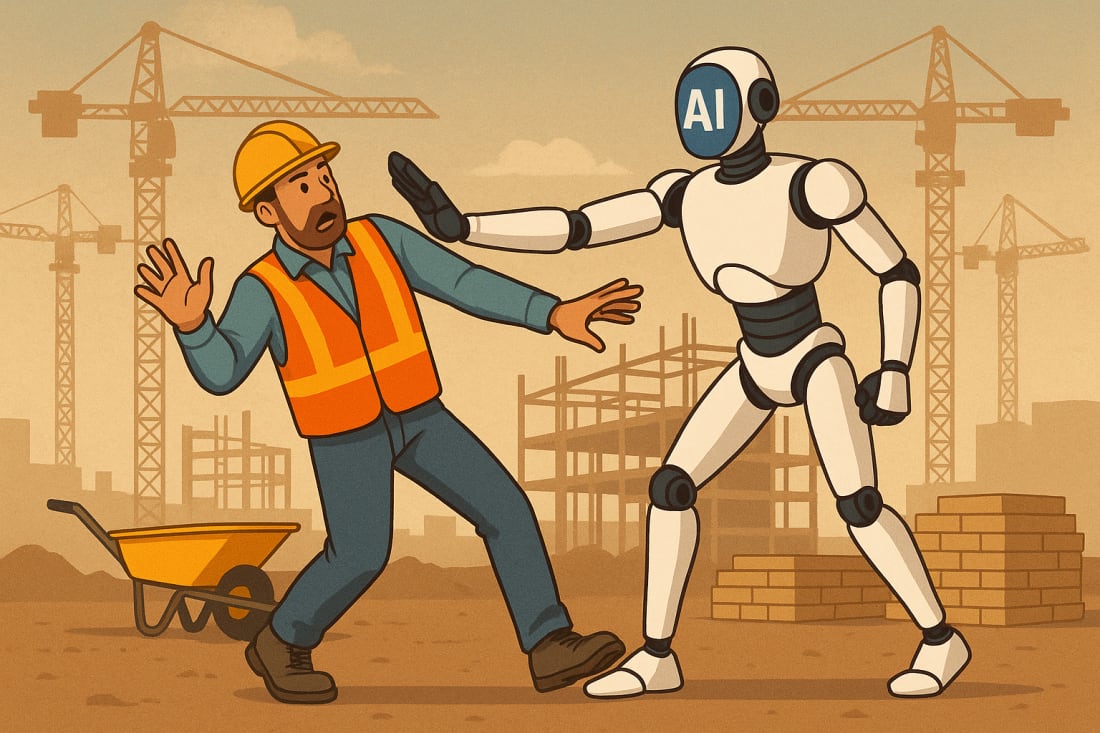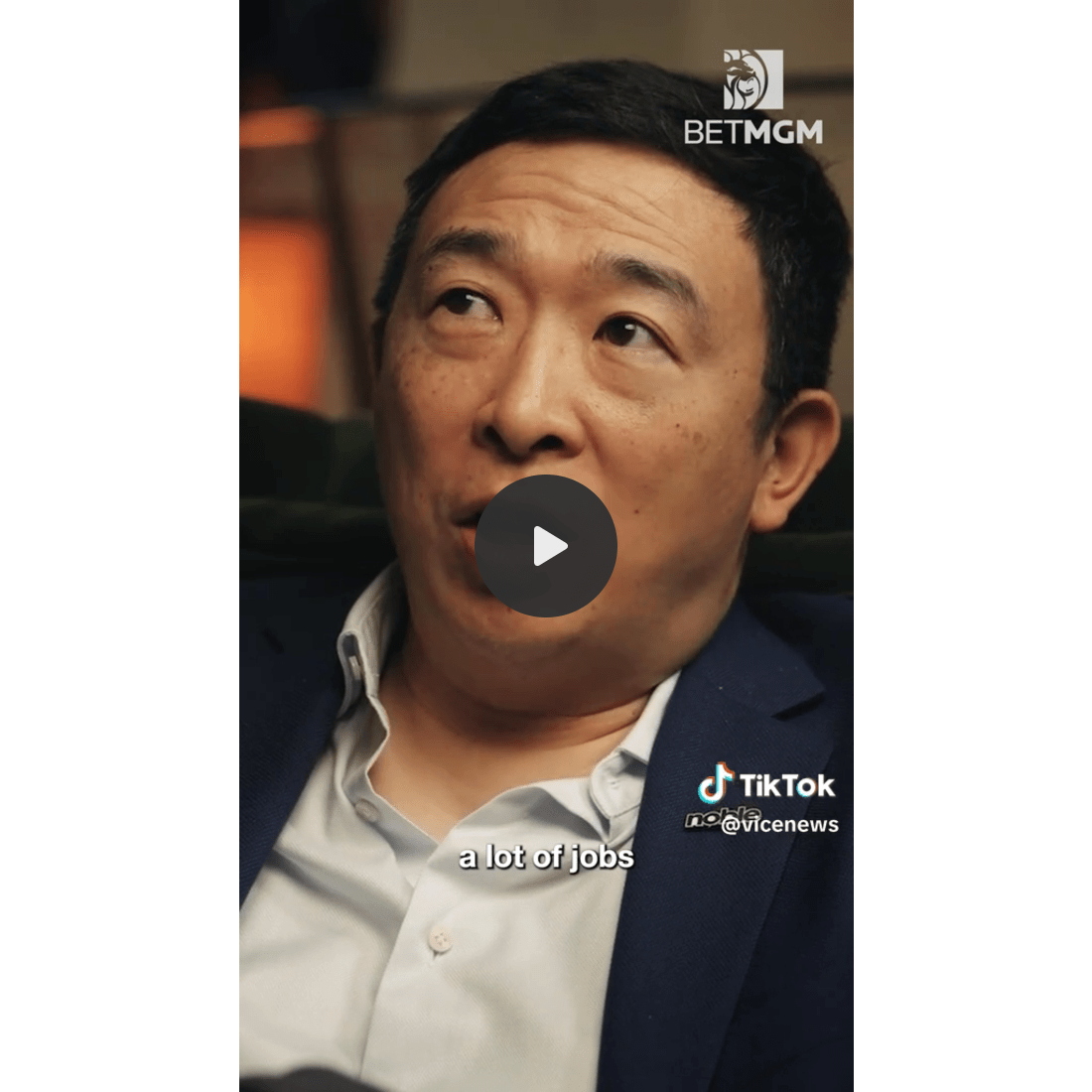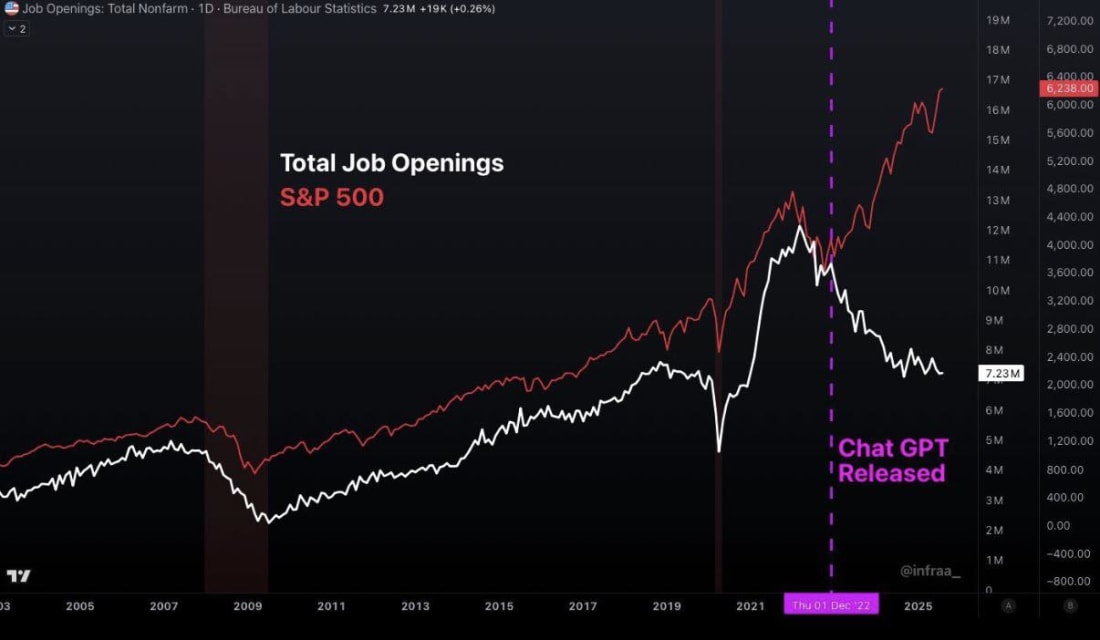|
The AI Revolution Is Already Killing Jobs — And We’re Still Being Told to Relax
Pretending this is just another industrial transition is dangerously naïve.
Let’s stop pretending.
AI is going to take a lot of jobs. Entire categories of them. And there is a massive gaslighting campaign telling people not to worry. Telling us it will all magically “balance out.” Telling us that this is just another industrial transition.
That narrative is both true and false.
Technology Always Replaces Jobs. That Part Is True.
We know technology replaces jobs. It always has.
That is one of the tradeoffs of progress.
Farmers in the early 1900s were replaced by mechanized agriculture. In 1920, more than 20 percent of Americans worked in agriculture. Today, it is under 2 percent, mostly because machines replaced labor.
Switchboard operators, including your grandmother and mine, were replaced by automated telephone systems. In the 1930s, operators were one of the most common jobs in the country. By the 1990s, the job was basically gone.
Steelworkers and riveters who built the industrial heart of America eventually lost their jobs to automation, lighter materials, and offshore manufacturing.
But humanity adapted.
New industries emerged.
People switched careers.
Millions globally were lifted out of starvation-level poverty because technology increased production, output, and wealth.
And technological superiority has always been tied to national power.
British gunboats dominated oceans not because of luck, but because they had the most advanced shipbuilding on Earth.
B-17 bombers revolutionized strategic warfare.
Missile guidance changed military doctrine.
Nuclear weapons reshaped geopolitics.
Now it is AI.
Whoever leads in AI will dominate the global economy and global security.
This part is not controversial.
The Lie: “AI Will Create More Jobs Than It Destroys, So Don’t Worry”
Here is where the gaslighting begins.
Yes, AI will create brand new jobs we cannot imagine yet. That has happened in every technological shift. Cybersecurity did not exist 50 years ago. Social media managers did not exist 20 years ago. Drone pilots did not exist 15 years ago.
But pretending that job creation will match job destruction is nonsense.
Twenty years ago, after manufacturing collapsed in places like Cleveland, Akron, Warren, and Youngstown, the message to displaced workers was to “learn to code.” As if a lifelong factory worker could magically transform into a software developer at age 55.
Some people adapted. Many did not.
And now the punchline is cruel:
AI is already coding faster, cleaner, and cheaper than junior developers.
So what exactly are people supposed to learn now?
AI is not taking one industry. It is taking all of them.
The First Dominoes Have Already Fallen
Truck Driving
Truck driving is the most common job for men in more than 20 states.
Companies like Tesla, Waymo, Aurora, and Kodiak Robotics already have autonomous trucks on U.S. highways. Nevada, Texas, and Arizona have approved commercial operations.
It is not perfect yet, but neither was the first car.
The direction is clear.
Nursing and Healthcare
Nursing is the most common occupation for women in America.
AI is already reading scans better than radiologists, triaging patients faster than nurses, and assisting with diagnosis in large hospital systems.
Robotics are entering elder care facilities.
AI charting tools now automate 70 percent of clinical note-taking.
This is not 20 years away.
This is happening right now.
Professional Work
Lawyers, paralegals, accountants, and financial analysts are already being replaced by software that can read, summarize, argue, and compute at superhuman speeds.
AI legal tools can draft briefs in minutes.
AI tax tools can analyze filings instantly.
AI medical assistants can diagnose conditions in seconds.
Middle management will be gutted.
Creators
Even YouTubers and TikTokers are not safe.
AI systems now generate complete videos, scripts, puppet-style hosts, voices, and editing.
Deepfake influencers are already more popular than real people.
Music is being generated on demand.
Books are being written by AI.
Commercial jingles, advertisements, and background scores are being fully automated.
If you think the creator economy will survive untouched, you are dreaming.
The Next Threat: Professional Entry-Level Positions Will Vanish
People assume doctors and lawyers are safe. Not really.
Picture this:
A new doctor graduates after 12 years of schooling. Instead of practicing, they are assigned to supervise AI diagnostic systems and robotic surgical assistants that replace 10 junior doctors.
A new lawyer graduates with $180,000 in student debt, only to discover AI systems now handle contract review, discovery, and case research.
The entry-level career ladder breaks.
Fewer humans needed.
Fewer jobs available.
More competition for the scraps that remain.
AI shrinks the professional class from the bottom upward.
AI Is Already Replacing Service Jobs — Quietly
AI call centers are exploding.
Real companies already do this:
• AT&T
• Bank of America
• Verizon
• Major hospital systems
• Airlines
• National retail chains
Even worse, voice-changing AI is now integrated into offshore call center operations.
Tools like ElevenLabs can convert an Indian or Filipino call center worker’s voice into a perfect Midwestern Ohio accent in real time. The caller never knows they are speaking to someone halfway across the world.
A call from a 216 or 440 number can be answered from Manila, with a voice that sounds like your neighbor in Parma.
When California residents call a 310 or 909 number, the software automatically switches to a California surfer accent.
This is not speculation.
It is being deployed right now.
Hiring Goes Down As AI Goes Up
Look at the hiring curves across tech, logistics, finance, healthcare, retail, and media. As AI adoption accelerates, hiring slows.
It is not a coincidence.
Companies are choosing automation over labor.
What Can We Do?
Let’s start with what we cannot do.
We cannot stop AI development.
Doing so would cripple national security and leave us behind China and Europe.
We cannot freeze automation.
Shanghai’s port is one of the most automated in the world.
Los Angeles and Long Beach ports are far behind, and American logistics already suffers because of it.

We cannot wage wars or impose major sanctions to slow other nations’ technological growth.
It backfires and destabilizes economies.
So what are our choices?
Possible Solutions
• Universal Basic Income (UBI), as Andrew Yang proposed
• Corporate automation taxes that fund displaced worker subsidies
• Employee-owned companies that distribute automation profits to workers
• Mandatory profit-sharing for companies using large-scale AI
• Incentives for industries that hire humans instead of replacing them
• National apprenticeship programs for emerging AI-era skills
• Wage subsidies for transitional periods
• Public equity stakes in AI-driven companies that rely heavily on autonomous labor
None of these ideas are perfect.
Some might fail.
Some might be politically impossible.
Some might create new problems.
But pretending nothing needs to be done is the worst option.
Will AI Ruin Society? Nobody Knows. But Ignoring It Is Stupid.
Maybe the optimists are right.
Maybe AI will unlock massive prosperity.
Maybe new jobs we cannot imagine will appear.
Maybe everyone gets richer.
But history tells us something very different.
When industries collapse, communities collapse.
Look at Northeast Ohio:
Steel mills disappeared, factories shut down, and entire cities still have not recovered 40 years later.
If you think AI will be any different, you are buying into the gaslighting.
AI will reshape the fundamental structure of daily life in America.
Economically.
Socially.
Culturally.
The only question is whether we prepare for it or let it destroy everything first.
So let’s start talking now.
Real ideas. Real policy. Real solutions.
Because pretending everything will be fine will not make it so.
What do you think?
The Angry Democrat: Matt Diemer is free today. But if you enjoyed this post, you can tell The Angry Democrat: Matt Diemer that their writing is valuable by pledging a future subscription. You won't be charged unless they enable payments.


